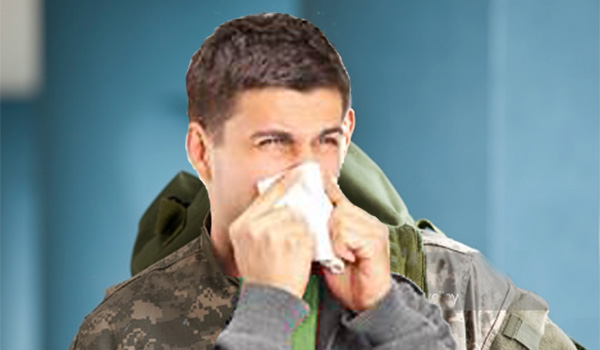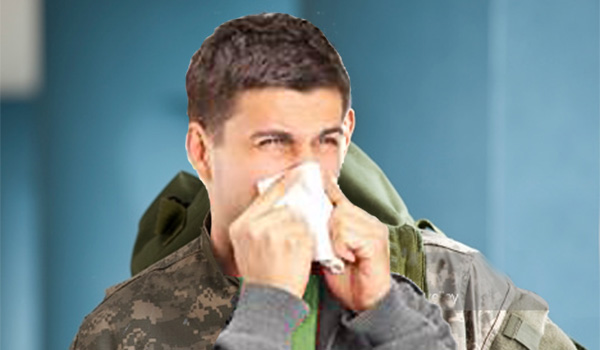
Ask the Flight Surgeon / By MAJ Jason MacDonnell, M.D.: Q: Doc, I am experiencing symptoms of runny nose, itchy eyes, sneezing, stuffiness and fatigue. How should I treat my symptoms and do I need a waiver?

FS: The symptoms you describe are consistent with allergic rhinitis (also called seasonal allergies or hay fever). Allergic rhinitis is a significant medical issue that affects nearly 1 in every 6 Americans generating almost $5 billion dollars in direct healthcare costs and over 2 million lost work days annually. This condition also poses a risk to the aviation community. The reduced sense of smell could be hazardous in the cockpit. Congestion and swelling could interfere with the movement of air resulting in airway compromise or discomfort. And the use of medications with unacceptable side effects has the potential for in-flight incapacitation.
What is Allergic rhinitis?
Allergic rhinitis is an inflammatory, antibody mediated disease that primarily affects nasal tissue and the upper respiratory tract. A variety of chemicals are responsible for triggering symptoms to include tree and grass pollen, mold spores, animal dander and insects like dust mites and cockroaches. Symptoms can be graded based on frequency, severity and temporal pattern. Frequency is divided into intermittent (less 4 days per week or <4 weeks per year) and persistent (>4 days per week and >4 weeks per year), while severity can be classified at mild (not interfering with quality of life) to severe (impacting quality of life). Intermittent symptoms that coincide with exposure to pollen from blooming plants cause seasonal allergic rhinitis. Allergens like pet dander and mold can cause perennial or year round allergic rhinitis. Other conditions like asthma, eczema and allergic conjunctivitis (red eyes) can be associated with allergic rhinitis and should be part of the conversation with your healthcare professional if other symptoms are present.
How is it diagnosed?
National guidelines state that the diagnosis of allergic rhinitis should be used when a patient presents with a history and physical exam consistent with an allergic cause as long as the patient has at least one symptom of nasal congestion, runny or itchy nose or sneezing. Physical findings that are seen with allergic rhinitis include swelling and discoloration around the eyes, swollen tissue and mucus in the nasal passages, inflammation of the throat and eustachian tube dysfunction. There are several skin and blood tests that can be used to diagnose allergies but are not required prior to treating patients with mild symptoms. Testing should be reserved for patients that do not respond to treatment or need to identify a specific allergen for targeted treatment.
How is it treated?
There are several treatments, both over the counter and prescription medication, used to treat the symptoms of allergic rhinitis. For mild symptoms, oral medications like loratadine (Claritin) or fexofenadine (Allegra) are reasonable choices. All other antihistamines like cetirizine (Zyrtec) are considered class 4 medications and cannot be used by air crewmembers. Intranasal sprays like fluticasone (Flonase) and mometasone (Nasonex) are recommended as first line treatment for moderate or persistent symptoms. Oral decongestants like pseudophedrine (Sudafed) can be used alone or in conjunction with antihistamines for a short period of time (tolerance can build to these medications). Immunotherapy (allergy shots) is an option for patients that have symptoms not responding to more conservative treatments. This treatment needs to be coordinated with your flight surgeon due to temporary grounding that comes with injections (AR 40-8, Temporary Flight Restrictions due to Exogenous Factors). Medications like montelukast (Singulair) can be used but is not considered first line treatment. Some patients have had success in reducing symptoms with controlling exposure to allergens like smoke, pets and dust and using nasal saline to rinse out allergens as part of a comprehensive treatment strategy.
Will I need a waiver?
Initial flight applicants who have required systemic steroids, immunotherapy within a 5-year period to application, or have a history of sinus surgery to include polyp removal must request an exception to policy. Crewmembers with mild seasonal or perennial allergic rhinitis treated successfully with short acting decongestants, non-sedating antihistamines, leukotriene modifiers, and/or intranasal steroids will have it noted on their annual flight physical as “information only.” A waiver will be required if the condition is controlled by immunotherapy, required systemic steroids, or specialty care, as long as there are no significant adverse effects.
Allergen exposure can change with the season and your location. This can lead to the presence of symptoms that degrade crewmember performance. We all want to optimize our effectiveness as crewmembers, so if you are experiencing symptoms of allergic rhinitis talk to your flight surgeon. Stay safe!
Questions
If you have a question you would like addressed, email it to This email address is being protected from spambots. You need JavaScript enabled to view it.; we’ll try to address it in the future. See your unit flight surgeon for your personal health issues. The views and opinions offered are those of the author and researchers and should not be construed as an official Department of the Army position unless otherwise stated.
MAJ (Dr.) Jason MacDonnell is a flight surgeon at the U.S. Army School of Aviation Medicine, Fort Rucker, AL.








